Introduction
- Management is the achievement or results through others (Marla,2009).
- Delegation means passing over managers responsibilities to the subordinates, supervising and controlling to ensure that the tasks delegated are performed properly (Giandomenico, 2001:116).
Delegation of what is referred to as deputation is an activity that involves the conferment of authority and passing over of responsibilities from one person to another in the organization usually at a lower level in the organization chart. As such the top managers can delegate authority and responsibilities to the line managers. (Giandomenico, 2001:116) similarly, the line manager can delegate his or her duties to the subordinate. It is important to note in this case that the person to whom the tasks are delegated to is supposed perform the duties given to him thereon on behalf of the of the manager. As a result the subordinate or the person to whom the authority and responsibility of performing the tasks is conferred to is thus empowered to make decisions that pertains the effective performance. Delegation therefore culminates to decision making being passed over from one level of the organization to anther usually lower. The manager’s responsibility however doesn’t cease upon the delegation as he is charged with ensuring that the responsibilities are performed to the required standards. If preformed properly delegation is not a renunciation of responsibilities by the manager. According to, delegation is passing over of tasks and responsibilities another person in the organization who is competent to do the task without close supervision. As such the person who is delegating must carry out a thorough research to identify the competence level of the employees as well as to establish what to delegate or not to delegate. The latter asserts that effective delegation just like effective managements must be must involve planning, organizing, effective leadership leading and absolute control or appraisal to ensure that the employee to whom the tasks are delegated to performs them to the required standards.
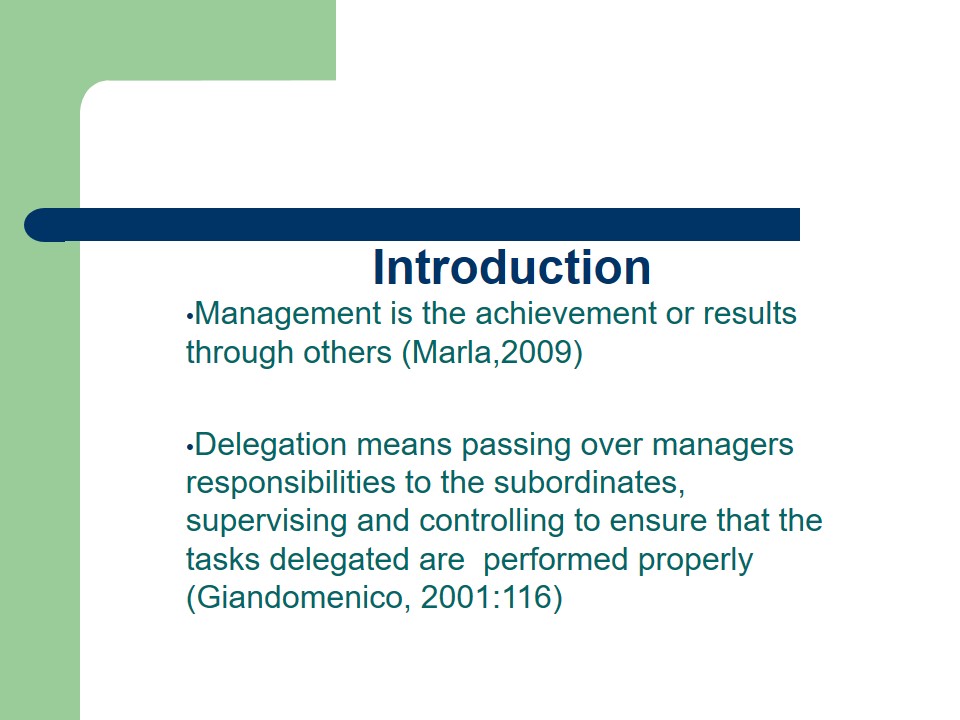
Importance of delegation to the company
- Maximum use of resources.
- Skills development and utilization.
- Increasing productivity.
- Employees motivation and reduction of employees turnovers.
Working with people and delegating work to them act as a means of training to the subordinates. This increases the capability of these members of the latter and therefore often benefits the organization. In addition, it helps in optimum utilization of human resources; motivate the subordinates as it helps make them fell important and appreciated, assist managers to offset work load as well help increasing the overall productivity of the organization (Marla, 2009).
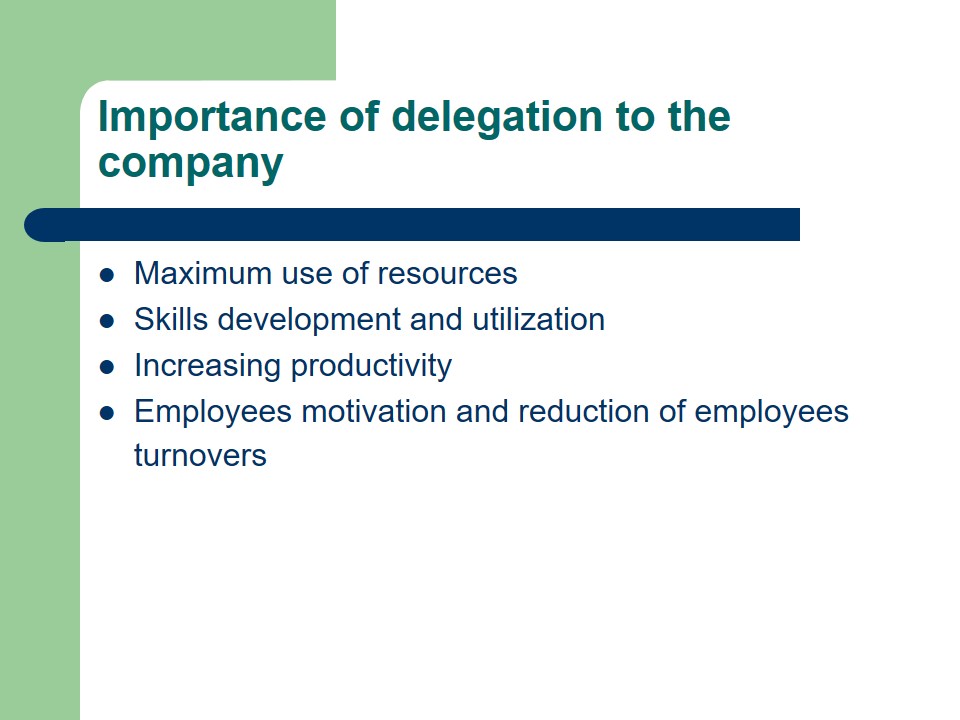
Importance of delegation to the manager
- Reducing time and work pressure for the manager.
- Enhances employees motivation.
- Fosters sharing of knowledge.
- Enhances good relationship between managers and subordinated.
Time consumption is important in any organization. Via effective delegation in the organization, managers can reduce time pressure. By asking someone to help in doing work for example finding an idea, completing task or assignment given, it is better it lowers the managers pressure via reduction of workload ( shared responsibility) and increase effectiveness through combined thinking. In addition, through implement the delegation in organization, employee can expand ability and sharing their knowledge with upper level management particularly decision making. It also, it will encourage their creativity and initiative. Also, Delegation will help to building good relationship between manager and their subordinate and also will developing interpersonal relation. When a manager and employee are in good relationship so that it can build good motivation and with that organization will achieve high performance standard base on employee accomplishment result (Giandomenico, 2001:116).
Time consumption is important in any organization. Via effective delegation in the organization, managers can reduce time pressure. By asking someone to help in doing work for example finding an idea, completing task or assignment given, it is better it lowers the managers pressure via reduction of workload ( shared responsibility) and increase effectiveness through combined thinking. In addition, through implement the delegation in organization, employee can expand ability and sharing their knowledge with upper level management particularly decision making. It also, it will encourage their creativity and initiative. Also, Delegation will help to building good relationship between manager and their subordinate and also will developing interpersonal relation. When a manager and employee are in good relationship so that it can build good motivation and with that organization will achieve high performance standard base on employee accomplishment result (Giandomenico, 2001:116).
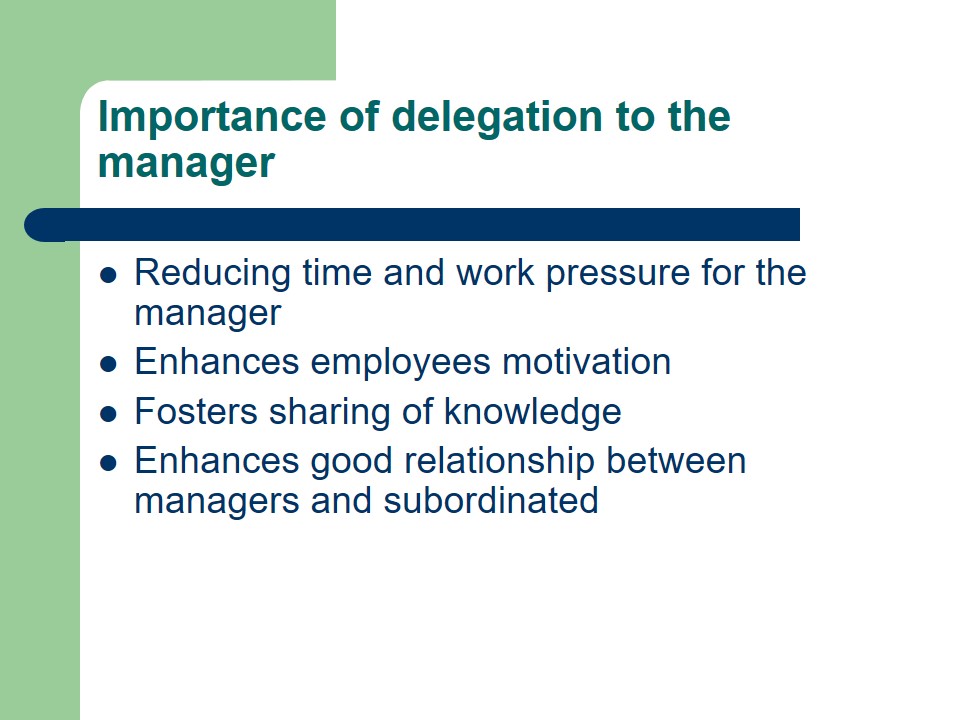
Planning delegation
- Decide What to Delegate:
- The manager should always delegate complete jobs;
- Identify tasks that can be done better by someone with a different set of skills.
- Decide who to delegate to Identify:
- An employee who has the willingness and absolute capability to do the work,
- An employee/ subordinate with ample time to do the job properly and,
- Who is trained to do the job and has been successful in doing it in the past.
First, the manager should Decide What to Delegate in this case he or she should Look for tasks in his or her Activity Log that can be quickly taught to someone else, or can be done by someone else who already has the necessary skills. In addition Identify tasks that can be done better by someone with a different set of skills like the identified employee in step one. For example, if you are a self-employed consultant, a trained bookkeeper is more likely to do a better job handling your accounts than you are. For effective delegation, the manager should always delegate complete jobs. Complete jobs are much more satisfying to work on than unconnected flotsam and jetsam of work. By doing this, you are also more likely to get back well-thought-out, properly integrated deliverables (Giandomenico,2001:115).
Secondly, the manager should decide who to delegate the tasks to since the choice may determine failure or success of delegation in this case the manager should identify an employee who has the willingness and absolute capability to do the work, subordinate with humble the time to do the properly and an employees who is trained to do the job and has been successful in doing it in the past (Marla, 2009:12).
NB. Some circumstances necessitate the managers to delegate tasks to subordinates who do not have the necessary experience. It is important to note inexperienced people will take time to train and will initially need close supervision to get the job completed to the correct standard. Such a manager should also expect that it will take before the task is completed satisfactorily, and should allow time for this in the commitments you give to other people.
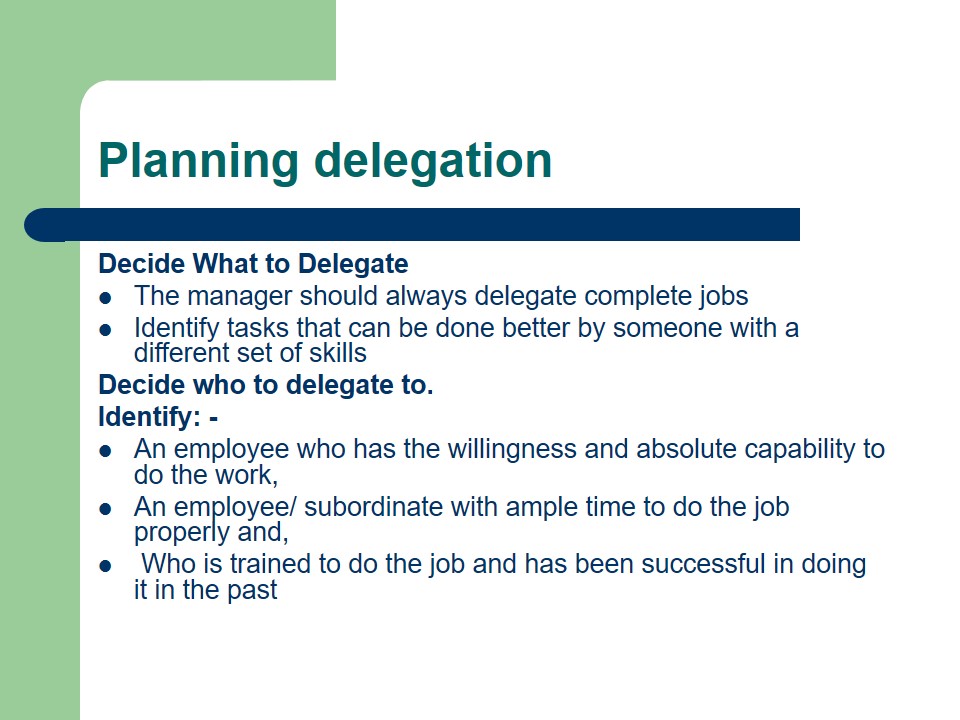
Organizing delegation
The manager should explain:-
- the purpose of the job to the client;
- Importance of the task;
- Requirements of the job and roles involved;
- Time limit;
- Resources available and constraints;
- Expected standards.
The importance or the reasons why the job needs to be done, and how this will help the clients, the company or the entire team, the specific roles and responsibilities that the employees need to accomplish as well as the expected standards of performance, the support that will be given to the employees or rather the resources available for the jobs the constraints and expected level of resources management by the subordinate. Also the manager should acquaint the subordinate on the time frame to perform the task as well as the various stages during the project at which he or she will review will review progress; in addition, the manage must reiterate his or her willingness and availability to give information or assistance to the subordinate when required to do so as to instill confidence and a feeling of protection on the part of the employee where needed (Marla, 2009:23).
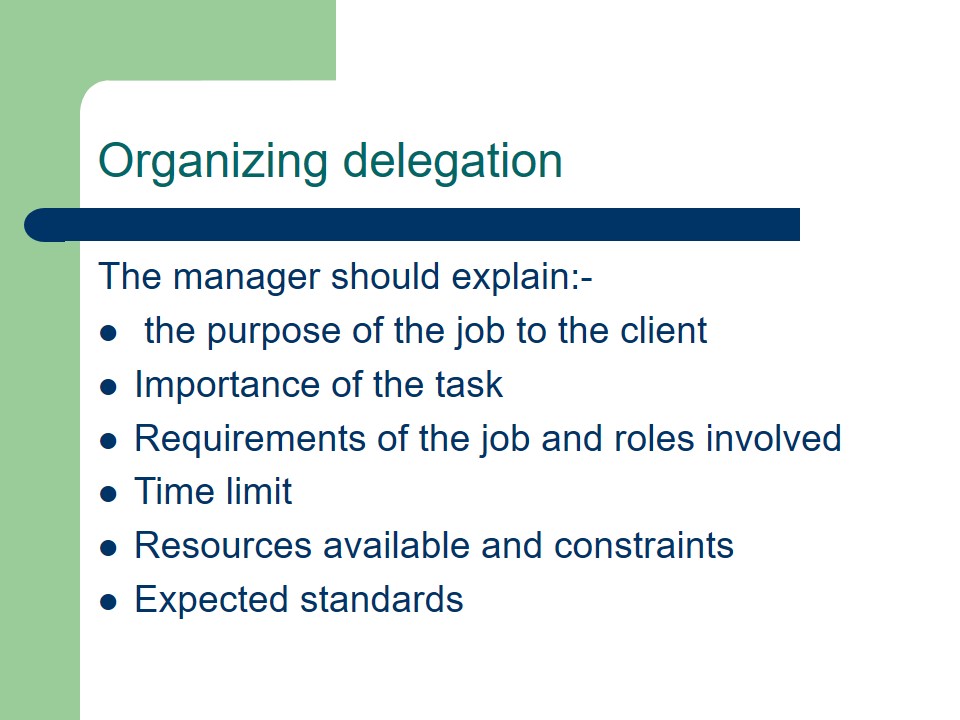
Managing the job (leadership)
To ensure the success of the project the manager should:
- undertake to carry out periodical review the project at the agreed stages;
- have a ready alternative plan in case things are not going as well as they were planned;
- be flexible enough to accept a new approach that the employee may adopt to perform the tasks;
- be available to give answer to questions or direct to the subordinate where appropriate;
- gives him or her optimum autonomy and authority to make independent decisions.
After a manager had delegated tasks to the subordinate, it is important that he gives him or her optimum autonomy and authority to make independent decisions that facilitates effectiveness in carrying out the tasks involved. However, the manager must undertake to carry out periodical review the project at the agreed stages, while being cautious not to micromanage the tasks therein. In this case, flexibility of the manager is critical as he or she should be flexible enough to accept a new approach that the employee may adopt to perform the tasks. Furthermore the manager must be available to give answer questions or to give direct the subordinate where appropriate. As such, he should meet the subordinate at the agreed points of the project in order to carry out the review of his or her progress and make corrections if such are require. For a manager to be strategic, he should have a ready alternative plan in case things are not going as well as they were planned hoped (Giandomenico, 2001: 115). Practically, especially when it is the first time that the responsibility are being delegated to the employee the manager musts be flexible enough to expect that work might not be done fully to his standards or expectation. As such the manager should be understanding enough and allow the employee time to make correction or even redo the work if such are necessitated Leave time for rework if appropriate.
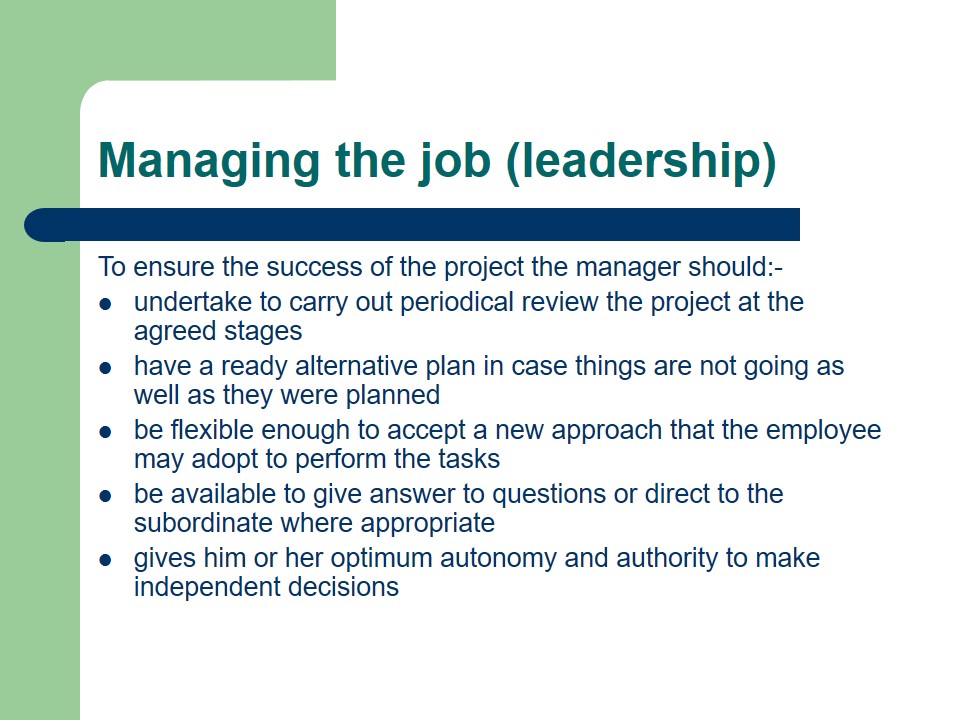
Quality of Work
Upon the completion of the task the manager should thoroughly and carefully go through the work to ensure it is of the best quality (Giandomenico, 2001: 115). As such the latter asserts that the manager should:
- Go through the work to ensure that it is done to your liking.
- Allow enough time to go through it to ascertain how well it is done.
- Accept the work from the subordinate only when you are sure that it meets the required and agreed standards.
- Thank, appreciate or reward the subordinate.
NB: accepting incomplete work would mean that additional time will be required to redo the job. Also the objective of training the subordinate to do the work to the required standards will not have been achieved since the employee will not have learnt to do the work to the required standards. The manager should in circumstances were the subordinate has done a gratifying work for him, let that him or her know. Appropriate praise will help to build their self-confidence and efficiency next time they do the job for you.
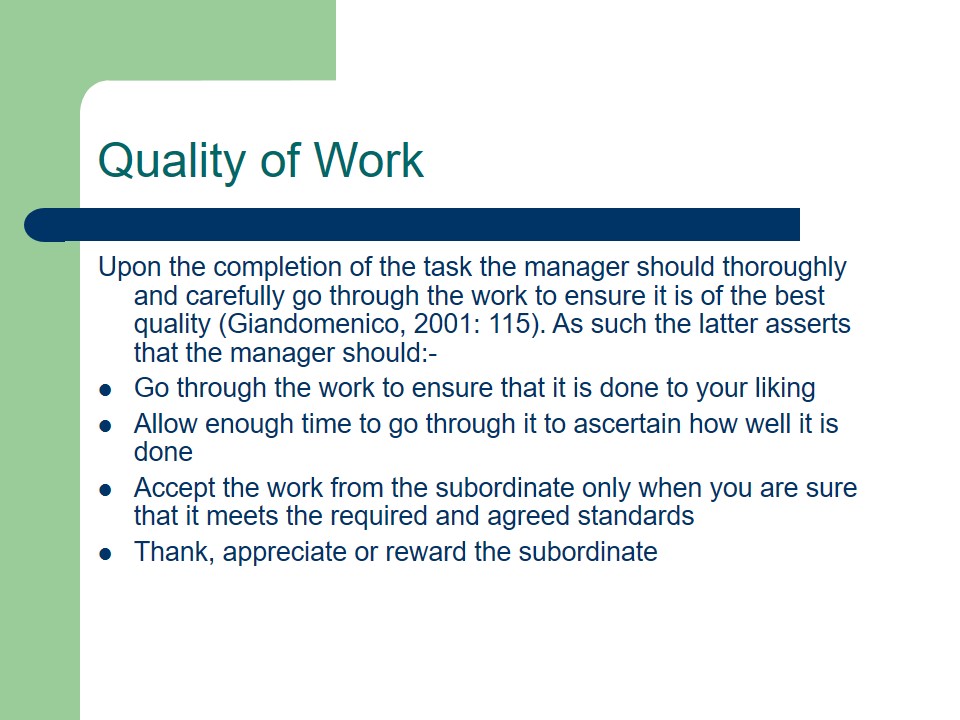
Guide to effective delegation
Giandomenico (2001: 117) gives a comprehensive guide to effective delegation which include:
- Get an Attitude Adjustment.
- Assess.
- Assign.
- Offer training in case the employee is inexperienced in carrying out the task.
- Monitor (control).
Virtually, management is to get results through others. Some management roles still involve a certain amount of spanning both the old and the new job. As a result he may be forced to May the force is with you if you’ve been told to do your old job in its entirety and manage others as well. If the manager’s accomplishment in the job from which he has been promoted or appointed is greatly satisfying to him or her, he or she may be inclined toward continuing doing the job himself. In that case, the manager must remind himself on daily basis that old activities are no longer part of his or her responsibilities job. The manager’s role in this case would involve offering training and direction to your direct reports as well as support, acknowledgment and a pat on the back for jobs well done.
Offer training in case the employee is inexperience in carrying out the task. To effectively delegate the manager should assess his or her team members’ capabilities on a task by task basis. For instance, a certain employees or rather subordinate may be exemplify good in taking inventory but has no experience in ordering and has no knowledge about the custom software system involved in undertaking ordering responsibilities. Delegating the responsibilities to such a person therefore would mean failure in its performance or else a lot of resources will be spent in training.
When an employee has had the necessary experience or training to be proficient, you can be confident about assigning the task or actual delegation. In case the manager is still not sure of the person’s ability perform the tasks, he can ask the person about their confidence to do the task and/or ask them to exhibit it for him or her. Seeing their competence should give the manager confidence o delegates the task. Furthermore, the manager should closely monitor the progress or rather check in early to confirm that the task is being completed in a manner that meets the standards that he or she has set. If there are mistakes, provide a quick comment to re-direct performance in order to avoid a ripple effect on other projects or other employee’s jobs. If things go to the worst the predetermined alternative should be used (Giandomenico, 2001: 117).
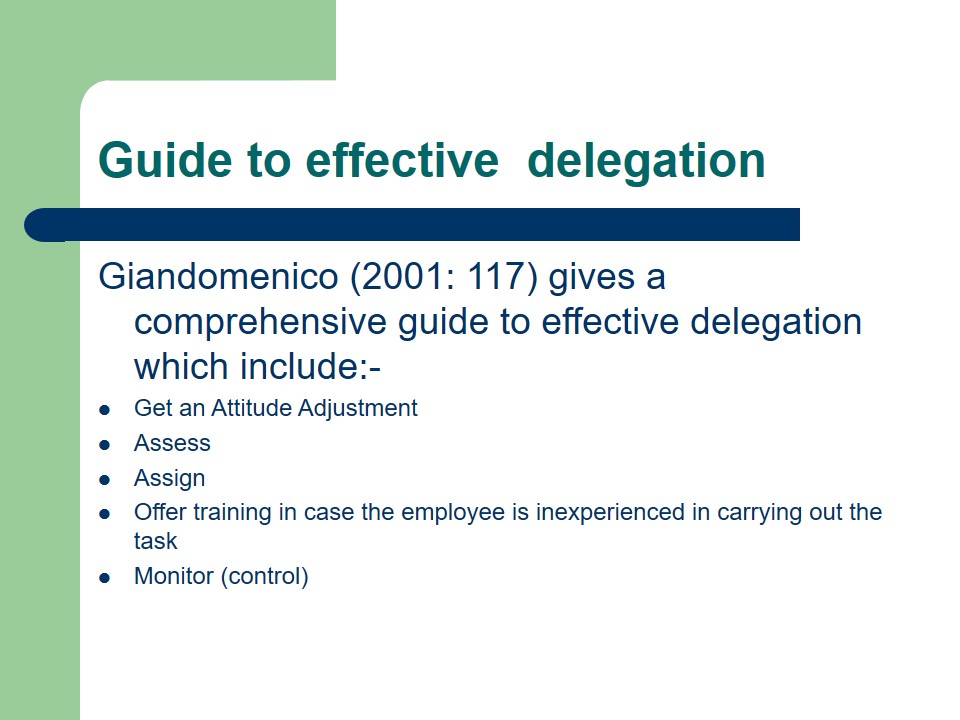
Conclusion
Tips for effective delegation:
- lDecision on what to delegate;
- lFind the right person to delegate to;
- lExplain the purpose of the job and what you expect;
- lDevelop an alternative plan;
- lGiving autonomy to the subordinate;
- lReviewing the progress at predetermined stages (control);
- lOnly accept back good quality work;
- lIf appropriate, reward the effort.
Delegation is an important skill for helping you to manage a heavy workload. If you do not delegate, you will quickly reach a stage where you stop progressing in your career because you simply cannot take on any more work. Ideally, the choice of the right person to delegate responsibilities to coupled by appropriate delegation of the right chores will maximized efficiency, effectiveness, competence reliability and speed in performing such responsibilities On the other hand, if the manager delegated responsibilities to the wrong employees who are not up to the job, the likelihood of the latter either doing the job wrongly, slow down his or her pace and reducing the manager’s ability to manage his or he work load is very which workload. This negatively affects the efficiency and effectiveness of management. Ideally, therefore effective delegation involves, effective planning, organizing, leadership and control of the activities involved therein. Working with people and delegating work to them act as a means of training to the subordinates. This increases the capability of these members of the latter and therefore often benefits the organization. In addition, it helps in optimum utilization of human resources; motivate the subordinates as it helps make them fell important and appreciated, assist managers to offset work load as well help increasing the overall productivity of the organization.
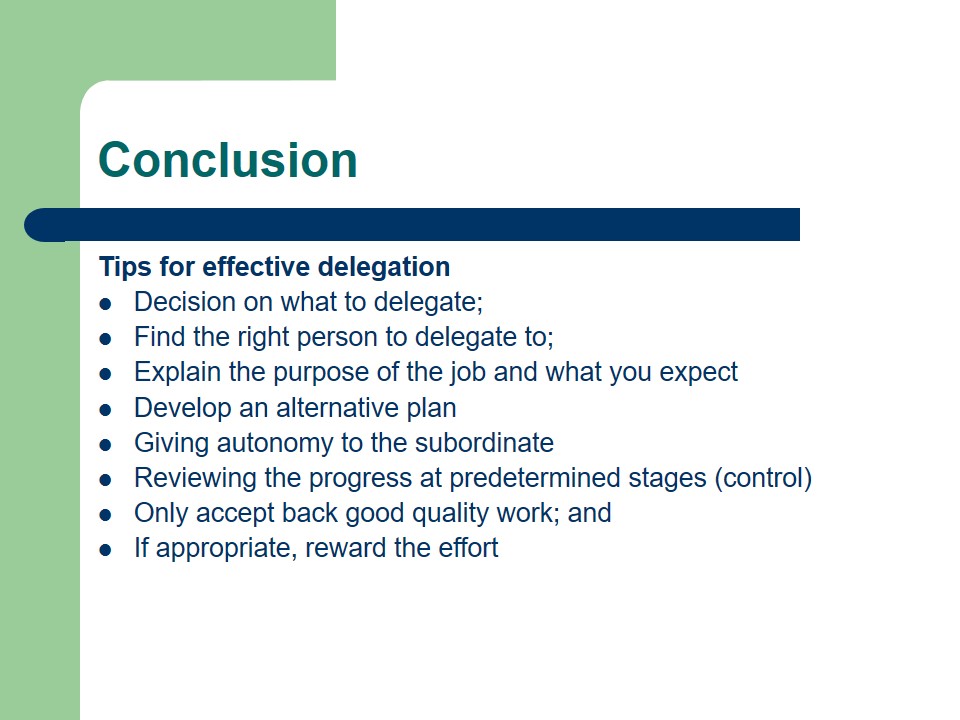
List of references
Giandomenico, M. (2001). Two Logics of Delegation: Agency and Fiduciary Relations in EU Governance” European Union Politics.; 2: 103-122.
Marla, R. (2009). First Time Manager – 5 Tips for Effective Delegation: journal of business management: vol12 no 12 pp. 11-23.